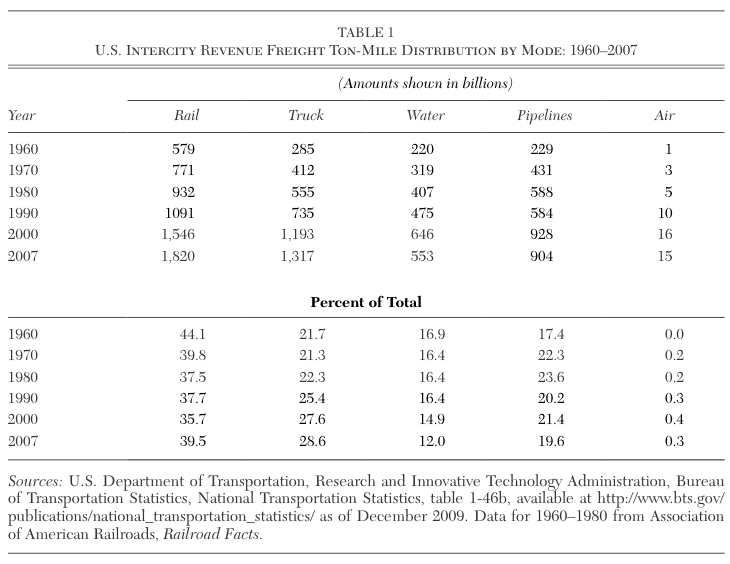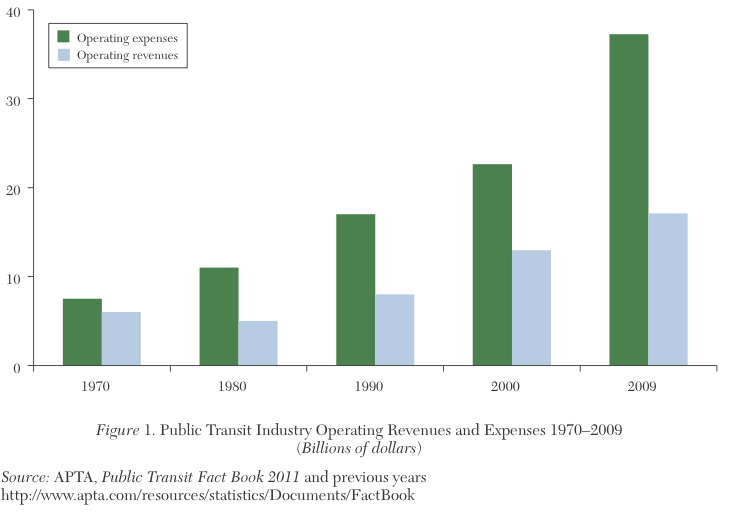BROOKINGS INSTITUTION
by Clifford Winston
Introduction
Transportation is a friction—a cost in both money and time—that must be incurred by individuals and firms to complete almost any market transaction. An efficient and extensive transportation system greatly enriches the standard of living in modern society by reducing the cost of nearly everything in the economy; expanding individuals’ access to and choices of employers and employers’ choices of workers; enabling firms and urban residents to benefit from the spatial concentration of economic activities, referred to as agglomeration economies; reducing trade costs and allowing firms to realize efficiency gains from specialization, comparative advantage, and increasing returns; and limiting firms’ ability to obtain market power by locating in geographically isolated markets with no competition. By increasing frictions, however, an inefficient transportation system, just like poorly functioning financial institutions (Hall 2010), can cause all sorts of economic activity to collapse.
Transportation is also important because it can be thought of as a merit good—that is, societies generally believe that citizens are entitled to accessible transportation to experience a decent quality of life no matter where they live, even if the cost of their service must be subsidized. To this end, both the public and private sector have provided and managed transportation throughout U.S. history and government policy has redistributed transportation resources across households with different incomes, between residents of urban and rural areas, across residents of different states, and between users of a specific service and general taxpayers.
Americans’ annual expenditures in both money and time on transportation are enormous. As reported in 2007 dollars by Winston (2010), consumers spent $1.1 trillion on gasoline and vehicles commuting to work, traveling to perform household chores and to access entertainment, and traveling for business and vacations, and spent an astronomical 175 billion hours in transit, which averages out to about 100 minutes per day for each and every American, valued at some $760 billion. Firms spent $1 trillion shipping products using their own and for-hire transportation, while the commodities that were shipped absorbed 25 billion ton-days in transit, valued at roughly $2.2 trillion.1 Local, state, and federal government spending on transportation infrastructure and services contributed an additional $260 billion, bringing total pecuniary spending on transportation up to 2.4 trillion, or 17 percent of GDP in 2007, which is as much as Americans spent on health care, and total annual money and time expenditures to more than $5 trillion! Finally, transportation looms large in American life because both the public and private sector have made huge investments in the transportation capital stock, which (after deducting depreciation) is valued by the U.S. Department of Commerce at nearly $4 trillion (2009 dollars).
The fact that this sector is so large and simultaneously so intertwined with virtually all other sectors in the economy suggests it is vital to assess the performance of the transportation system and to consider how it could be improved. At first blush, this appears to be a daunting task given the system’s size and complexity. However, because the government is so heavily involved in the system’s performance through its management of public infrastructure and services, regulation of private sector competition and externalities, and subsidies for travelers and private carriers, my view is that a constructive assessment can by performed in this paper by analyzing whether the United States has the optimal mix of public and private provision of transportation. And while I focus on the U.S. transportation system, my discussion is relevant to all transportation systems that must consider this issue.
In what follows, I outline the theory of efficient provision of transportation, describe how public–private provision in the United States has evolved historically, and summarize the salient features of the current system. I then survey the empirical literature on the public sector’s performance, which indicates that our hugely important transportation system has been compromised by policies that have resulted in inefficient pricing, suboptimal investments, and inflated production costs that are manifested in congestion, delays, budget deficits, and excessive money and time costs to users and excessive government expenditures on transportation.
The hundreds of billions of dollars in welfare costs motivate either improving public provision or expanding the role of the private sector. I point out that political forces and limitations of transportation agencies strongly contribute to inefficient policies and, in my view, constrain efficient improvements in public provision. Thus, for example, policymakers have called for a significant increase in spending on the nation’s transportation infrastructure, but they have not considered how inefficient pricing policies have prevented travelers and shippers from making efficient use of existing infrastructure and how mispricing has distorted signals for investments in new capacity.
An alternative policy—privatization and deregulation—calls for fundamental institutional change to rid the system of its shortcomings that are attributable to current government policies and to rely on market competition to allocate transportation resources efficiently. Theoretical arguments and empirical evidence based on international experiences and simulations of the effects of privatizing certain parts of the U.S. system provide some support for this approach but they do not resolve all of the important uncertainties about its effects in practice. I therefore call for modest, localized experiments that would give economists and other analysts the opportunity to develop crucial empirical evidence based on actual U.S. experiences to help guide policymakers’ decisions on what parts of the transportation system, if any, should be privatized and deregulated to improve its performance.
Read full report (PDF) here: Caution Ahead
About The Brookings Institution
www.brookings.edu
“The Brookings Institution is a nonprofit public policy organization based in Washington, DC. Our mission is to conduct high-quality, independent research and, based on that research, to provide innovative, practical recommendations that advance three broad goals: Strengthen American democracy; Foster the economic and social welfare, security and opportunity of all Americans; and Secure a more open, safe, prosperous and cooperative international system. Brookings is proud to be consistently ranked as the most influential, most quoted and most trusted think tank.”
Tags: Brookings Institution, Clifford Winston, On the Performance of the U.S. Transportation System: Caution Ahead








 RSS Feed
RSS Feed